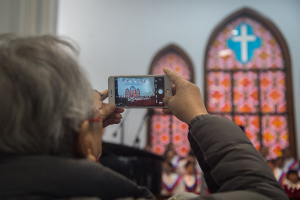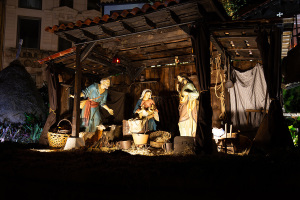Jerry Sandusky's Pastor Comments on Case in Sunday Sermon (FULL TRANSCRIPT)
Just days after former Penn State football coach Gerrald Arthur "Jerry" Sandusky was convicted on 45 counts of sexually abusing 10 boys over a 15-year period, his pastor and friend the Rev. Edwin Zeiders responded to the case, the verdict and its implications in a Sunday sermon titled "Peace! Be Still!"
Zeiders, the Senior Pastor of St. Paul's United Methodist Church where Jerry and Dottie Sandusky worship, sought to define the purpose of the church and the calling of Christians in light of the sexual abuse case affecting the State College community. Zeiders, speaking on Sunday, June 24, suggested in the sermon that the congregation was among "the most scrutinized parish in the United States" because of the case. He described the attention given the community a "divine opportunity" for believers to show the world their moral strength and the power of the Gospel of Jesus Christ.
Here is a full transcript of Pastor Zeider's sermon:
"I want to introduce these remarks today and then preach. You will know the difference because there is a prayer in the middle."
"I want to express my gratitude to all of you who have been gracious to sustain one another and especially the pastoral staff during these last three years. That is the length of time that I have been conscious of the circumstances that have impacted our community."
"Over the course of many years, now beginning my 46th in the ministry, I've been asked by a number of people and even recently, 'How do you do this?' I think that Pastor Karen and Pastor Eric and all of my predecessor pastors in this place have all been asked the same question and for a variety of reasons."
"Today we are living with the implications of something quite important in our life together. And I want to respond to the implications of this with this homily. Copies of this homily will be available through the week if any of you are interested in actually reading it, to pursue its content in a fuller way and to talk with me about the implications of this self-disclosure."
"One of the important things about being in ministry is the degree to which the pastoral leader leads, and also the degree to which the pastoral leader is transparent. This is a risky time in the life of the church, and I'm going to explore that deeply as we move through this homily."
"Essentially, I want to share with you an operating assumption that has guided my life. And it may have been obvious to you that this operating assumption was operating or not, visible or not. I make the distinction spiritually and theologically and personally between the words 'acceptance and agreement.' They are not the same thing."
"Acceptance is a way of understanding a set of circumstances and working within those set of circumstances. Agreement, you know, is a very different matter of yeses and nos, or I agree and disagree, or I have a different perspective. Over the course of these years of my journey if I have been congruent about anything, it's about this distinction between the meaning of acceptance and agreement. That operating principle in my life lays behind this text and everything I want to tell you today about my journey."
"Let us pray. Holy and benevolent God we stand in a most peculiar place at this time in the world, as your people, specifically in this congregation. We and others have faced such adversity and have been challenged by the opportunities that are before us. Thank you for my colleagues, pastors and staff and congregation. And for the wonderful ways in which we have shared together. Pour Your spirit upon us now for the preaching of the hearing of the Gospel. Let these words be Yours and these ideas Yours. And help us to focus our attention together for these moments, that Your word might live in our heart and energize the way in which we live together. Amen."
"If you would ask me, 'Pastor Ed who are we?' I would respond quickly as I am about to do, thus the note paper on the cover of your bulletin. Although those note spaces are available for lots of things, perhaps today as I reveal the fundamentals of my own journey in light of the consequences that we face together in our region and our world, it may help you to write things down."
"If you ask me, 'Pastor Ed, who are we?' I would respond like this: one, we are God's people, the consequence of God's calling us into the Gospel of our Lord; two, we are the recipients of God's amazing love in Jesus Christ. God acted on our behalf – for God so loved the world that He gave His only son, that whosoever believes in him should not perish but have everlasting life."
"First, we are God's people, the result of God's interventions; second, we are the recipients of God's amazing love in Jesus Christ; third, and of great importance for this homily, is that we are gathered together, the consequence of the work of the Holy Spirit. Congregations are expressions of God's work, the forming of them is God's work, your participation in them is God's work. Don't ever believe for a moment, don't ever believer for a moment, that St. Paul's exists because you've chosen to be here. You have been chosen to be here."
"Next, we nurture one another toward Christian maturity, that's who we are – we are responsible in the vows of baptism and the covenant of membership to take care of each other. That is to nurture each other in the faith, not aloof from one another's journeys at all. But deeply committed to each other in the way in which me mature in the Gospel."
"We are called next to stand by one another as we promise in our vows: 'I will uphold you. I will uphold the church with my prayers, my presence, my participation in one another's life, in my gifts, cash and otherwise, and my Christian service in the world.' To take those vows is to be spiritually entangled with one another and there is nothing we can do about that. That is definitive of who we are. And finally, we are sent into the world as disciples of Jesus for the world's transformation. And that implies a lot about my transparency today."
"If you would ask me a second question – 'Pastor Ed, in light of who we are,' the assertions I just made, 'what are we to do?' The to do question is a very complex one because 'doing' is linked to the nature of the experience of others around us. Those of us who serve in very public ministries here, and actually there are hundreds of you and I congratulate you for that – literally hundreds of St. Paul's people are at work in these communities around us and in many other ways across the world. The 'do' question is particularly singular and collaborative. What are we to do is a very different proposition than what the congregation tells the pastors and the staff what they ought to do. Here, we are dealing with the unfolding of the Gospel of Jesus Christ, and it is meant to be transformational for all of us personally and together.
"Think about the Jesus story with the sinking of the boat and the angst of the sailors. 'Jesus,' my paraphrase, 'we are swamped with the water and frightened of the storm around us. Wake up, Jesus! Do something, and do it quickly!' I should publish that,what do you think? Now is the moment, now is the moment for the divine intervention in the storms that are raging around us. In my notes and in my heart I want to say something to you right now. Now is the turning point for St. Paul's United Methodist Church, and we dare not miss this divine opportunity. We must seize the holy moment, when the world we know is terribly torn, at war and upside down. Don't miss the moment. Don't do anything to add to the confusion, lest all of us perish.
"For many years, the most glorious affirmation of the church has been the resurrection of our lord Jesus Christ. And the evidence of the resurrection is in the existence of the church itself. This has been the most profound argument for the resurrection. Not just that the church exists, but that the church is empowered by the Holy Spirit for the work and the life of the ministries with Jesus at the center. And for two millennia those who have been a part of the body of Christ have given witness to this affirmation: that Jesus Christ is alive, that Jesus Christ is the redeemer, that Jesus Christ is transforming our lives.
"The most profound witness to the efficaciousness, the effectiveness, the reality of the Gospel is your life. The way in which you assert on the one hand that Christ is your savior and lord and on the other hand, make that visible on the Earth real time, in real human relationships. The historic Christian story only matters in every generation if the people who claim it actually incarnate in their behavior those truths that we assert together.



























